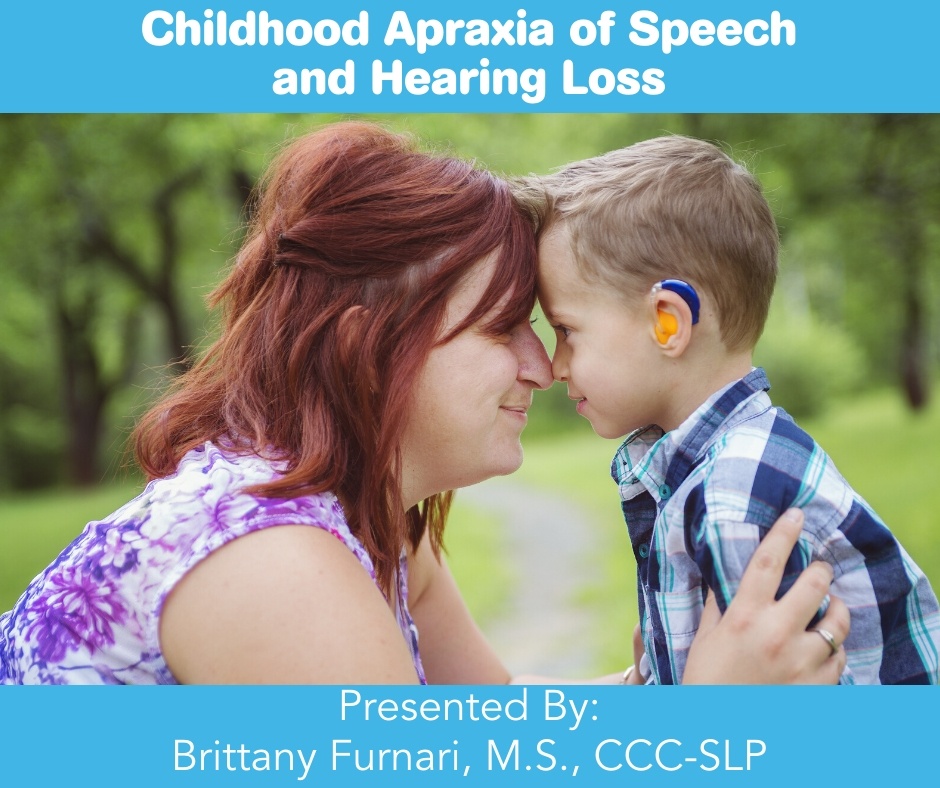
06 Jan Childhood Apraxia of Speech and Hearing Loss
Course Abstract:
This presentation reviewed how the diagnosis and treatment of childhood apraxia of speech (CAS) differs in the presence of a co-occurring, aided hearing loss. There are numerous speech-language features and challenges unique to both CAS and hearing loss. The first portion of this presentation explored how the speech-language skills and needs of both conditions are related. Listeners learned how to conduct a valid CAS evaluation for children who present with aided hearing loss. The second portion of the presentation contained two case study videos, both featuring children with hearing loss. A review of the observed clinical signs and symptoms of CAS, diagnostic decisions, and therapy planning followed. The third portion of the presentation concluded by exploring the need for further research to examine the complex relationship between CAS and hearing loss.
Presented By: Brittany Furnari, M.S., CCC-SLP
This course is offered for 0.05 ASHA CEU’s (Intermediate level, Professional area)

Learning Objectives
- List 2 ways an aided hearing loss may alter the way you conduct a CAS evaluation.
- Describe the audiology “string bean” and its impact on target selection or assessment for a child with both aided hearing loss and CAS.
- Explain 2 ways in which you would alter CAS therapy to accommodate a child who also presented with a co-occurring, aided hearing loss.
Timed Agenda
10 minutes – Background information related to pediatric hearing loss
10 minutes – Examining the relationship between speech-language skills and challenges for both populations
5 minutes – Steps for a valid CAS assessment for children who present with hearing loss
10 minutes – Case study #1
20 minutes – Case study #2
5 minutes – General therapy considerations for children with hearing loss
5 minutes – Empowering parents, special cases, and future research
Course Abstract:
This presentation reviewed how the diagnosis and treatment of childhood apraxia of speech (CAS) differs in the presence of a co-occurring, aided hearing loss. There are numerous speech-language features and challenges unique to both CAS and hearing loss. The first portion of this presentation explored how the speech-language skills and needs of both conditions are related. Listeners learned how to conduct a valid CAS evaluation for children who present with aided hearing loss. The second portion of the presentation contained two case study videos, both featuring children with hearing loss. A review of the observed clinical signs and symptoms of CAS, diagnostic decisions, and therapy planning followed. The third portion of the presentation concluded by exploring the need for further research to examine the complex relationship between CAS and hearing loss.
Presented By: Brittany Furnari, M.S., CCC-SLP
This course is offered for 0.05 ASHA CEU’s (Intermediate level, Professional area)

Learning Objectives
- List 2 ways an aided hearing loss may alter the way you conduct a CAS evaluation.
- Describe the audiology “string bean” and its impact on target selection or assessment for a child with both aided hearing loss and CAS.
- Explain 2 ways in which you would alter CAS therapy to accommodate a child who also presented with a co-occurring, aided hearing loss.
Timed Agenda
10 minutes – Background information related to pediatric hearing loss
10 minutes – Examining the relationship between speech-language skills and challenges for both populations
5 minutes – Steps for a valid CAS assessment for children who present with hearing loss
10 minutes – Case study #1
20 minutes – Case study #2
5 minutes – General therapy considerations for children with hearing loss
5 minutes – Empowering parents, special cases, and future research
Credentials:
Hours of Operation:
Treatment locations:
Address:
,
Phone:
Email:
Overall Treatment Approach:
Percent of CAS cases:
Parent Involvement:
Community Involvement:
Professional consultation/collaboration:
Min Age Treated:
Max Age Treated:
Insurance Accepted:


